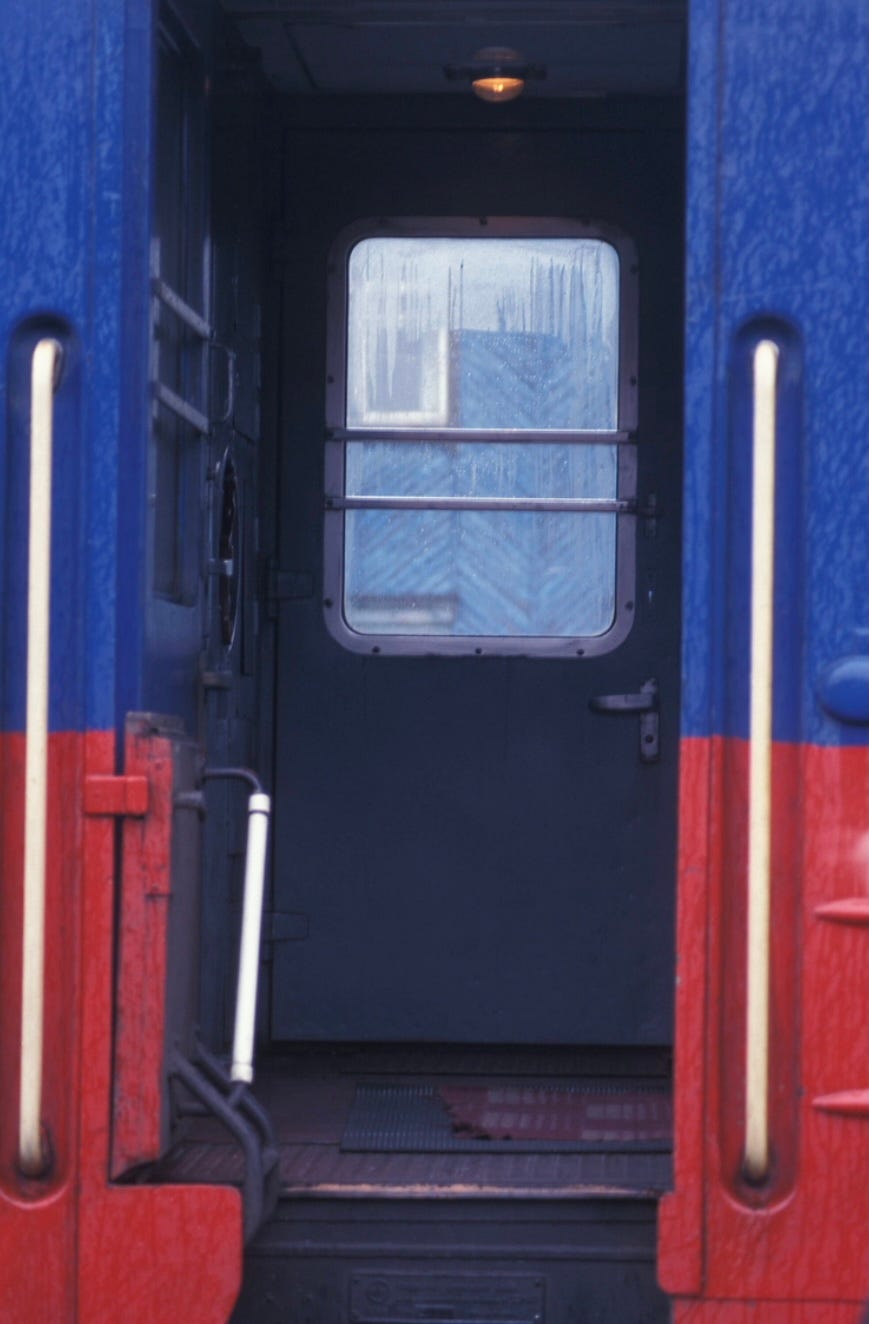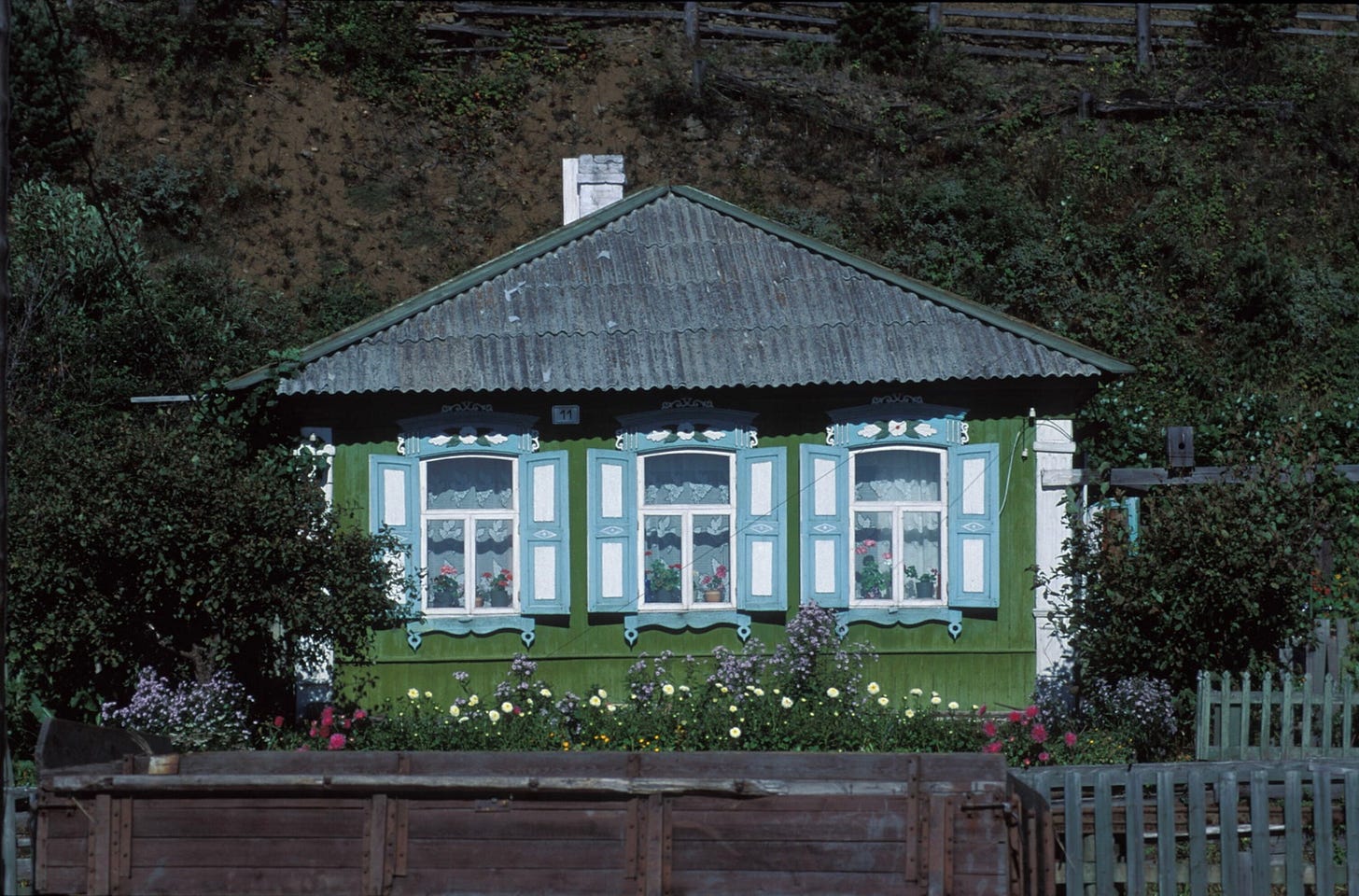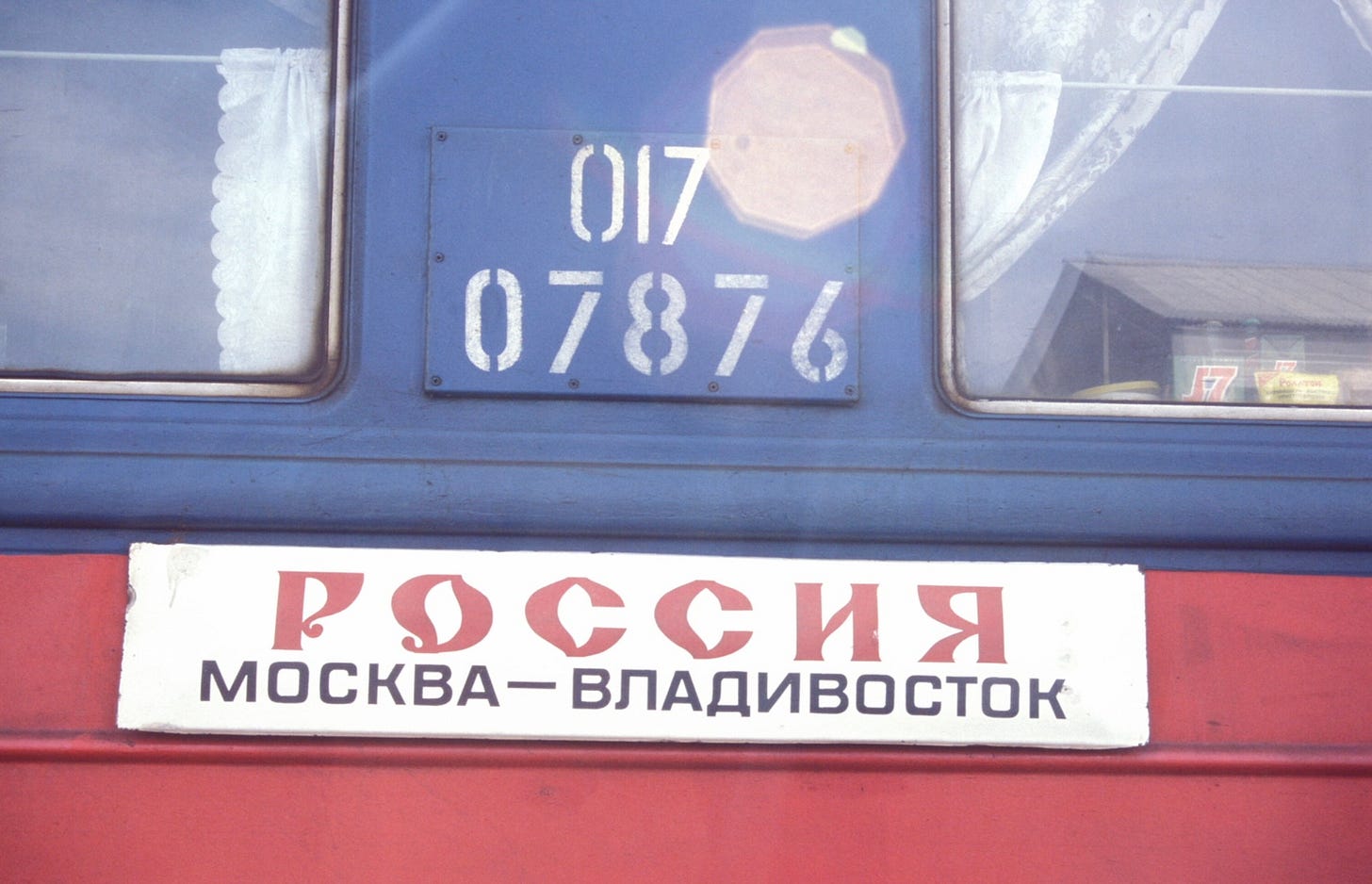Welcome to Common Sense and Whiskey, a short, sharp, weekly look at the world out there, delivered free to subscribers on Fridays.
This week most of What Just Happened will detour from the news to travel along the TransSiberian railroad.
The annual NATO summit was Tuesday and Wednesday in the Hague. CS&W will have two posts next week, the usual What Just Happened on Friday and a separate post to recap the summit.
If you find CS&W useful, please consider subscribing for Friday newsletters and other occasional reports. It would be great if you could contribute, but there are no paywalls here—you can always read the whole column.
Let me know what you think. Now, let’s get started.
WHY WRITE ABOUT ALL THIS WAR STUFF ALL THE TIME? Most of this year Common Sense and Whiskey has been absorbed with Russia’s war on Ukraine. In the course of writing about the Russian assault, I’ve found myself dwelling on military topics much more than I ever set out to, and that makes me a little uncomfortable.
I thought these Friday columns would summarize a few of the week’s most interesting news items from around the world and maybe I could add a little of my own perspective about places I’d been, sometimes using maps.
But instead, week after week I find the Friday column sprinkled with military arcana and acronyms. ATACMs and HIMARS are not in my wheelhouse. But for people who live in Europe and North America, Russia’s war on Ukraine is the most consequential geopolitical event of the 2020s by far, the single thing with the most potential to realign the political world we inhabit. And so I write about war, and not completely comfortably.
In a column earlier this month about Polish defense matters, journalist Cristina Maza, author of the Lazo Letters Substack (I recommended it!), wrote sensibly about this same idea. Here is her quote:
“And before you say, “hey, Cristina, this is all related to war and militarism. I’m against those things! I don’t care how much Poland or any country spends on its defense. We should all spend less,” or something along those lines, please remember that Russia is a real security threat to both Europe and the United States. And unless that changes, we all need to invest more in our militaries. I would also like to see national governments invest more in infrastructure and healthcare and education. But if they can’t do that, please take it up with Putin.”
I’ll try to expand on this idea of ‘why war coverage' in the weeks to come. Now, on to this week’s column, and something a little different.
•••••
The news has crowded out other stuff in the last year or so, but there are also lots of travel columns on CS&W. Since most people aren’t charter members, here are links to a few of the travel stories newer readers may have missed: Greenland, Easter Island (Rapa Nui), East Africa, Europe’s Invisible Corner, Wildebeest Migration, Papua New Guinea, Svalbard, Mekong Delta, Finland/Russia border, Côte d-Ivoire, Faroe Islands, Ascension Island, Moldova. There are more on the CS&W main page. And I’ve written some travel books, too.
TRANS-SIBERIAN RAILWAY: Last week I wrote about a new travel deal you will surely want to miss—a new Russian Railways eight-day, ten thousand kilometer trip between Moscow and Pyongyang.
Twenty-five years ago though, the world was a different place. My wife and I traveled on the TransSiberian railroad, flying Lufthansa from Frankfurt to Ekaterinburg (it really was a different world), and traveling from there east to Irkutsk, before turning south across Mongolia and on to Beijing. As an escape from this week’s heat wave across the eastern half of the United States, here’s some random notes from the train. It’s not so much a travel narrative as a collection of my thoughts at the time:
East of Barabinsk a particular aquamarine colored paint took hold of all the buildings, henceforth and forevermore to be known as Siberian Green. The sky settled into a deep blue with puffy clouds, the kind of pollution-free weather we don’t get anymore back home.
The dining car menu spoke four languages, using “mith” for “with,” as a convenient cross between the English “with” and the German “mit.’ On the theory that they can't hurt you with soup, we enjoyed chicken noodle. The whole dining car smelled like last night's party - old beer and cigarettes.
The idea of keeping up with the hours fell away. The timetable showed local time and Moscow time, and it was either fifty minutes early or four hours ten minutes late, take your pick, at the next stop.
The sun slanted in as the Rossiya chugged into and out of the biggest city in Siberia, Novosibirsk, at 1.6 million, here due solely to the Ob River railroad bridge. In Novosibirsk, some boulevards were made of real tarmac. There was said to be an enormous opera house, and somewhere nearby was the purpose-built city of Akademgorodsk – a city of scientists.
Housing blocks stretched along, too many to count. Since this was a mere settlement in Czarist times, and didn’t really get going until Stalinism was the style, Novosibirsk was just flat plug-ugly.
Out on the platform, Roma beggars displayed whining snotty children as evidence that yes, they were miserable.
Sunflowers hung their heads with nowhere to point. Pumpkins were on the vine alongside the cabbage fields. All the hay was cut and lay in heaps tall as houses. Smoke rose above a few chimneys, but the temperature was bracing, and in light of the months to come you’d think they wouldn’t have bothered with fires.
It was morning, early, between six and eight, but already the villages stirred, those that rose up the rainy hillsides east of Krasnoyarsk.
Children played on the gravel track.
A man all in gray, smoking, walked a sodden path, coat flapping at his flanks - a scene that could have taken place in the last century – or the one before that. From compartment nine we took it all in – the mists in the trees, the elderly clustered at the storefront door, the birches steadily losing their autumn battle, the smoke rising from this odd shack or that.
A battleship gray sky defined the whole world.
The Rossiya crossed the mighty River Yenisei, that rises in Mongolia, bisects Siberia, and even here means “wide river” in the local Evenki language.
The Yenisei waterway energizes Krasnoyarsk industry, and the bridge across it dramatically started our day. The different clack-clack on the bridge jolted us awake. The train was still quiet as we took drinks from the Samovar.
She drank the chai provided in a heavy glass mug she got from the provodnitsa, whose name was Lydia Ivanova, and I, rather less in harmony with my surroundings, enjoyed Eight O’Clock brand instant coffee in my Evernew brand silver titanium 400 mug.
Up and down the coast in Greenland, each settlement presents its worst to arriving visitors. Since the only contact there is by sea, your arrival by boat will be met by benzene storage tanks and refuse waiting to be hauled away. There was a little of that first-things-first frontier utilitarianism in these villages, too.
Giant metal gantries extended the power grid right straight over and through residential areas, and a hundred TV antennas sprouted, and then over time listed randomly over the rooftops.
After Novosibirsk, especially east of the River Yenisei, we’d crest a hill and stare down at birch and aspen forest as far as the eye could see, broken only sometimes by patches logged for firewood.
In valleys the sky was slate. Only from hilltops might you peek at distant, pale blue, which might foreshadow improving weather in the afternoon – or might not.
By now it was easy to spend hours between stops in a dreamy half-consciousness – just be still and the movement of the train would do the work of the hypnotist’s pocket watch. Over the course of the week, epic dreams starred everyone I'd ever known and featured vague, unfulfilled intimations of desperate evil.
The hypnosis of the rails made travel across the taiga deeply restful. Hours slipped happily by. I imagined that in winter, with the darkness, that’s all the more true.
•
Kilometer 4375, Ilanskaya: Twenty minute stop. Felt good to get out of the train and stand in the rain. As you began to miss refrigerated drink, the cure was ice cream from the kiosks. Kerchiefed babushkas sold cucumbers from a bowl and the provodnitsa bought carrots. The baby next door was the star of the train and everybody played with him at the stops.
•
By a town called Taishet, the music inflicted from tinny speakers on the platforms had ceased to be repetitive, cloying Russian pop. It had an Asian, even Indian rhythm.
Taishet was a gulag transit camp. The factory in Taiset where prisoners once died creosoting railroad ties still operates. The Rossiya didn’t stop for long, just three or five minutes.
We planned to leave the train at Irkutsk, so one morning before her daily vacuuming tour, I visited the provodnitsa’s den down by the samovar and the drying mushrooms to make sure of our arrival time in Irkutsk. It sure was 2:25 in the morning. I had written “Irkutsk” in Cyrillic on a card and I said “pazhalsta.” She smiled and put down her gossip magazine. I pointed at the word, my watch, turned up my palms and shrugged.
She asked, speaking fast Russian and gesturing, “Moscow time or local time?” and since I knew how to say the word ‘Moskva,’ I chose Moscow time and she clucked “nyet nyet nyet” and wrote it for me in local time (2:25 a.m.) and then in Moscow time (9:25 p.m.).
•••••
If you’re reading this as an email, your provider may clip this article before the end. Try clicking on ‘view entire message’ to see the whole thing, or you can always read everything at Common Sense and Whiskey online.
•••••
5:00 p.m., Nizhny Udinsk, kilometer 4680: A big stop, fifteen minutes. The taiga had been running dense and hilly.
I shook some instant coffee into my mug and stopped at the samovar by the door. First we were trapped on a narrow siding, then a green local train pulled away and opened a long area of kiosks across the tracks.
A whitewashed building painted “toilet” was bigger than most houses, with six multi-paned windows along the side. The usual scruffy commerce occurred beside the train, and three girls with high, Asian cheekbones and reddish hair panhandled – only two, really, and quietly. The other was too meek.
They were insistent, but not even faintly in the way of the souk, and they slipped away of their own volition just before Lydia Ivanova, provodnitsa-in-chief, strode up to shoo them away.
Basic provisions, gossip magazines, a newspaper – things to pass the time were on sale in the kiosks – and cassettes: bootlegs with typed covers like Captain Jack ’97, Dance Rocket Part 2 and Hit Hammer, and several with women in lurid poses.
Gray and chillier now, and for the first time, in patches, the birches were completely yellow.
•
At dusk, lights glowed from inside the old wooden Siberian houses and smoke rose straight into the air from the chimneys. We sat before the window and considered compartment nine in carriage seven of train number two our own personal travelling theatre.
The mist-green of the taiga and the soldier-blue sky merged in the fading light, and the light in the compartment reflected on the glass an image of the accumulated odds and ends of travel: Ms. Ivanova's heavy, stout glass, chai bags and books and sugar cubes. Reading glasses and a roll of toilet tissue, hot sauce and a plate and aqua minerale. Plastic cutlery and half a pack of raspberry sweet crackers.
Now we were stopped in front of an unlit stretch of track and people bustled about. Someone came and someone went, but it was all in the dark and we couldn't tell. Was it Zima?
No, it was too short a stop. Zima would be more important than that, and then it would be four hours 53 minutes to Irkutsk.
But Zima never came. No cluster of lights ever suggested suburbs, and the Rossiya hurtled on through the dark. So I did the sensible thing. I went to buy some beers.
Sasha in the bar car exuberantly proclaimed our friendship. He sat with the lady in charge of the restaurant car. Muscles bulged from his t-shirt, which was inexplicably drenched with sweat. He ordered three bottles of wine for himself. The attendant had to do the invoice on a calculator and in longhand and deliver the bottles before it was my turn, giving Sasha time to uncork and decant a couple of glasses.
"Sasha, Weelyum," he shouted and stuck his finger in our chests. I had a gulp, we professed friendship, and I turned to find every eye in the restaurant, amused, on me.
I pointed and explained, "Sasha." They smiled and agreed.
Finally it was back to our berth to break out the bags and fuss about, because we'd be getting off the train in four hours, or three, or five.
I am sure only God will ever know why, of all the world's music, Funky Nassau ("Mini-skirts, maxi-skirts, Afro hair DOOs….") ran in a continuous loop through my brain from Krasnoyarsk to Irkutsk.
And then Zima came to us as a slight strip of concrete between two trains populated by smoking Siberians, and nothing more.
The night provodnitsa had ten till seven Moscow time. According to Lydia Ivanova, main and day provodnitsa, who must have been kicking up her heels at this hour in the provodnitsa lounge, arrival in Irkutsk was expected at 9:25 Moscow, 2:25 Irkutsk.
At 2:00 I tried the bar car for a last minute take-away pivo (beer) or two. At 2:00 a.m. it was a rockin', smoky, all-Russian party car.
If only we’d known.
The short-order cook by day ruled tonight, and he rose from beside Ludmyla, his puffy-haired paramour, and wondered what kind of pivo I wanted, starting to tick off Baltica,…. And I said Melnick (which means Miller) and he went to get some.
Ludmyla was convinced I was a secret Russian.
"Russki?"
"Nyet, Amerikanski."
"Russki!" with a wag of a finger and a suggestion that we would all have champanski. But by now we were minutes from arrival in Irkutsk.
I paid a buck-a-beer to the smiling short-order cook and smelled like a smoking factory as I bumped back down the corridor.
I got in the way of a woman entering the toilet. She stepped back - in her nightie - with her husband.
Flustered, I summoned the Russian "Spaseba," and she replied "Not at all" in flawless English.
•••••
That’s it for this week. I’ll see you twice here next week, with the usual Friday What Just Happened and with a separate debrief on this week’s NATO summit.
Thanks for reading. Please pass this article around and invite your friends to subscribe. And do let me hear from you. See you next week.
Content on Common Sense and Whiskey is free. There’s no paywall, but if you subscribe for $5 a month or $50 a year for 2025, next time I’m in town I’ll come over and wash your car. Maybe.
After all, you don’t get to travel on a Russian train everyday.
Cheers,
Bill













